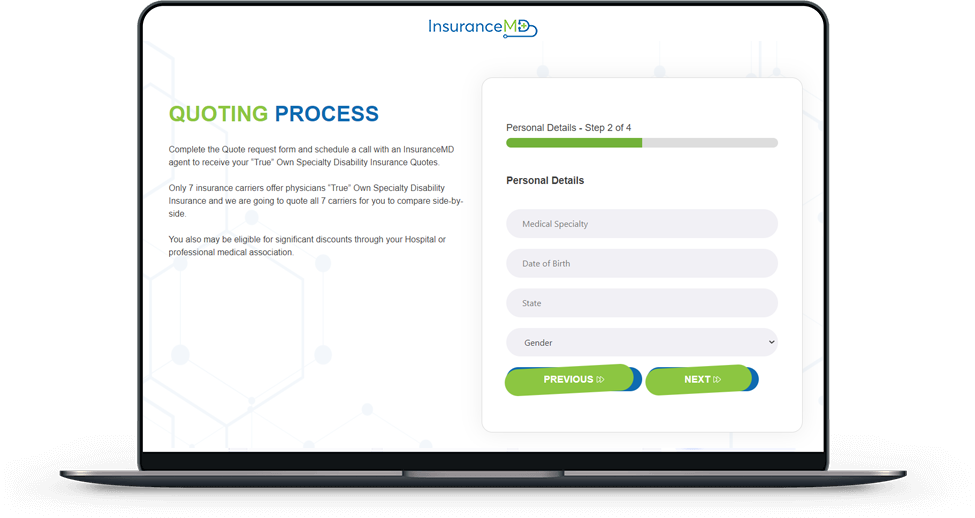what is own speciality
disability insurance?

Disability Insurance is the first financial stepping stone to protecting your income against the statistical facts that say you have a 1-in-4 chance of suffering a long term disability that results in your inability to work in your medical specialty prior to your age of 65.
Every disability policy outlines the specific degree in which you would have to be disabled in order to qualify for coverage and will be defined within your policy under the definition for “Total Disability.”
Disability Insurance policies can differ on their definition of what they consider a total disability and it’s imperative that you pay close attention to the language of this definition. Ultimately what you want to have is a policy that provides a definition of “Total Disability” known as “Own Occupation” and sometimes referred to by physicians as “Own Specialty”.
Own Occupation Disability Insurance (Specialty Specific or Regular Occupation) offers a definition of “Total Disability” in which you are eligible to receive your “full” benefit if a sickness or injury prevents you from working in your “Regular Occupation.” You will still be considered “Totally Disabled” and eligible to receive your “full” benefit if you elect to work in another occupation, regardless of the income you earn.
Employer-Sponsored Long
Term Disability Insurance is NOT True Own Specialty
Group Coverage is taxable and may not allow you to collect your full benefit if you elect to work in another occupation. True Own Specialty Disability Insurance is only available through five insurance carriers: Ameritas – Guardian – MassMutual – Principal – The Standard.
If you have a disability plan through the AMA or Northwestern Mutual, then you may not be Truly covered.


What Carriers offer True Own Specialty Disability Insurance?
Only five insurance carriers are providing True Own Specialty Disability insurance to physicians. Ameritas – Guardian – MassMutual – Principal – and The Standard.
Unlike the coverage offered through Employer Sponsored plans, these five carriers offer an Own Specialty Disability insurance policy that will pay your full Tax-Free monthly benefit if a sickness or injury prevents you from working in your medical specialty while allowing you to earn an income in another occupation.
what riders truly matter?
True Own Specialty Definition of Total Disability
The Definition of Total disability remains the most important feature of every Long Term Disability Policy. True Own Specialty Disability insurance pays your full benefit if a sickness or injury prevents you from performing the duties of your medical specialty while continuing to pay your full benefit even if you elect to work in another occupation.


Residual/Partial Disability
Residual disability coverage should be included in whichever policy you purchase. This rider protects you from the inability to earn your regular income caused by a sickness or injury while you remain working in your medical specialty.
Non-Cancellable & Guaranteed Renewable
This remains an important feature for every disability policy. Nan-Cancellable simply means that the insurance carrier cannot raise the rates or change the policy provisions within your contract. Guaranteed Renewable provides peace of mind where the carrier is guaranteeing you that they will renew your policy every year regardless of your current health or income.


Future Increase Options
Future Increase options should be considered for physicians who’s earning potential may increase as they progress in their career. This rider guarantees that the carrier will increase your benefit regardless of your health so long as your income justifies the increase.
Catastrophic Coverage (CAT)
Catastrophic riders were the least popular rider in 2020 among physicians. This rider provides an additional monthly benefit should your disability result in your physical inability to perform 2 out of the 6 Activities of Daily living as defined by Investopedia.


Cost of Living Coverage (COLA)
This rider is more important for younger physicians. It protects you from a disability that occurs while you are younger and the rise of inflation. This rider is less attractive to physicians above the age of 55 where the risks associated with inflation and disability are no longer as crucial.
Why Rates Vary
Everyone’s quote is different based on the following factors:
- age
- Sex
- medical specialty
- Health history
- existing coverage
- policy riders
- available discounts
- benefit amount


 800-538-3767
800-538-3767